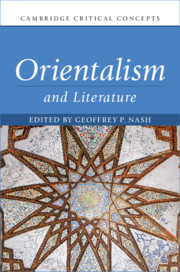Book contents
- Orientalism and Literature
- Cambridge Critical Concepts
- Orientalism and Literature
- Copyright page
- Contents
- Contributors
- Acknowledgments
- Introduction
- Part 1 Origins
- Part II Development
- Part III Application
- Chapter 14 From Orientalism to Islamophobia
- Chapter 15 Applications of Neo-Orientalism and Islamophobia in Recent Writing
- Chapter 16 Orientalism and Cultural Translation: Middle Eastern American Writing
- Chapter 17 New Orientalism and the American Media: New York Cleopatra and Saudi “Giggly Black Ghosts”
- Chapter 18 On Orientalism’s Future(s)
- Chapter 19 “The Engine of Survival”: A Future For Orientalism
- Further Reading
- Index
Chapter 14 - From Orientalism to Islamophobia
from Part III - Application
Published online by Cambridge University Press: 01 November 2019
- Orientalism and Literature
- Cambridge Critical Concepts
- Orientalism and Literature
- Copyright page
- Contents
- Contributors
- Acknowledgments
- Introduction
- Part 1 Origins
- Part II Development
- Part III Application
- Chapter 14 From Orientalism to Islamophobia
- Chapter 15 Applications of Neo-Orientalism and Islamophobia in Recent Writing
- Chapter 16 Orientalism and Cultural Translation: Middle Eastern American Writing
- Chapter 17 New Orientalism and the American Media: New York Cleopatra and Saudi “Giggly Black Ghosts”
- Chapter 18 On Orientalism’s Future(s)
- Chapter 19 “The Engine of Survival”: A Future For Orientalism
- Further Reading
- Index
Summary
Edward W. Said’s Orientalism effected a radical transformation in the social sciences and humanities in the late 20th century by changing the meaning of “Orientalism” from the benevolent western subject’s human interest in the East to an apparatus of knowledge and writing aligned with western imperial power.1Said’s coupling of western power with knowledge was a direct intervention into the writing of the universal and transparent grand historical narrative which culminated in the modern West. Orientalism was ostensibly a discourse of western “expertise” on the “East”, its lands, cultures and peoples; but, from Said’s critical perspective, it was about the West and its power of writing the world in accord with its own interests and rule, and producing itself as the universal subject of knowledge, reason and civilization. Said’s original insight implied a powerful sense of the production of the Orient as a vast area of knowledge and governance, while at the same time he saw this production as an imaginative geography, which distorted a supposedly real Orient and created a phantasmatic idea of it. As his best critics underlined however, Said’s analysis involved a methodological contradiction between two different concepts of Orientalism: one in which Orient is constructed as real and another one in which its reality is distorted.
- Type
- Chapter
- Information
- Orientalism and Literature , pp. 255 - 268Publisher: Cambridge University PressPrint publication year: 2019
- 2
- Cited by



